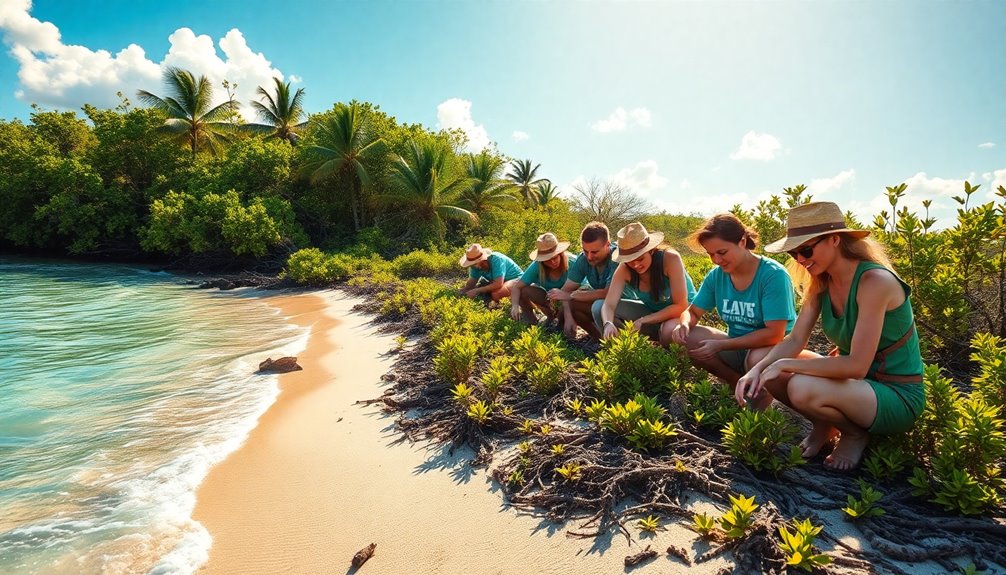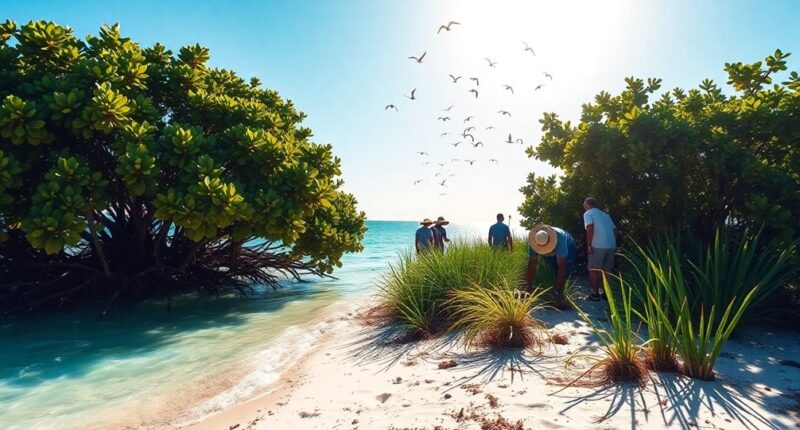Coastal Guardians are revolutionizing shore protection in the Florida Keys with a blend of nature and engineering. They focus on restoring mangroves and using soft armoring techniques that stabilize shorelines while reducing wave impact. With about 8% of the shoreline suitable for these nature-based solutions, they aim to enhance both coastal defenses and local ecosystems. By fostering collaboration among stakeholders, they create a united approach to tackle climate challenges. There's much more to discover about their innovative strategies.
Key Takeaways
- Coastal Guardians employ innovative, nature-based solutions to protect the Florida Keys from rising sea levels and increased hurricane threats.
- Restoration of mangroves and vegetated shorelines enhances coastal stability while benefiting local wildlife.
- GIS-based tools guide tailored stabilization strategies to address the unique challenges of different shoreline areas.
- Approximately 67% of the Keys' shoreline is already vegetated, providing a strong foundation for effective protection methods.
- Collaboration among private stakeholders, public entities, and local communities is crucial for successful coastal protection initiatives.

Coastal Guardians are stepping up to protect the shores of the Florida Keys, ensuring resilience against climate hazards like rising sea levels and hurricane threats. With projections showing sea levels could rise by up to 0.30 meters by 2050, flooding is becoming an increasing concern for the unique geography of the Keys.
Coastal Guardians are actively safeguarding the Florida Keys from rising sea levels and hurricane threats, addressing urgent flooding concerns.
You've likely noticed the frequency of hurricanes, like Irma and Ian, wreaking havoc since 2015, making the need for effective protection more urgent than ever.
Fortunately, Coastal Guardians are embracing innovative solutions that blend nature with engineering. They're restoring mangroves and coastal strands to stabilize shorelines while enhancing ecosystem resilience. By using soft armoring techniques—natural materials like plants and rocks—they're addressing erosion without compromising the environment.
You might appreciate how these vegetated shorelines can reduce wave impact, proving beneficial for both coastal protection and local wildlife. Recent storms have highlighted the importance of these nature-based solutions] in safeguarding vulnerable areas.
The Guardians are also leveraging cutting-edge GIS-based tools to identify the best stabilization methods for different shorelines. Through spatial analysis, they assess shoreline exposure and draw on expert insights from coastal engineering and marine biology. This data-driven approach ensures that you're not just getting temporary fixes; the solutions are tailored to the unique challenges of each area.
You'll find that approximately 8% of the Florida Keys' shoreline is suitable for these nature-based solutions, while 67% is already vegetated. This gives a strong foundation for implementing effective strategies.
Collaboration is key, and the Guardians emphasize the importance of involving both private stakeholders and public entities to foster a united front against climate threats.
As you think about the ecological role of mangroves—supporting biodiversity and stabilizing soil—you can see how these initiatives are crucial not just for protection but for preserving the natural beauty and health of the Keys.
With each step, Coastal Guardians are paving the way for a more resilient future.
Frequently Asked Questions
What Specific Methods Does Coastal Guardians Use for Shoreline Protection?
Coastal Guardians use a mix of nature-based solutions and hybrid approaches for shoreline protection.
You'll find them planting mangroves, creating oyster reefs, and enhancing beach dunes to stabilize shores. They also combine natural materials with hard structures for added resilience.
Advanced GIS technology helps them analyze shoreline conditions, while community involvement ensures effective implementation.
How Can Volunteers Get Involved With Coastal Guardians' Initiatives?
You can get involved with Coastal Guardians' initiatives by participating in local cleanup events or educational programs.
They often seek volunteers for wildlife conservation and habitat restoration projects. If you have specific skills, like marine science knowledge, put them to use!
You'll not only help protect the environment but also gain valuable experience and contribute to the community.
Keep an eye on their website for upcoming opportunities and events to join in!
Are There Any Costs Associated With Supporting Coastal Guardians?
Did you know that investing in nature-based solutions can save communities up to $4 for every $1 spent on shoreline protection?
Supporting Coastal Guardians does come with costs, such as funding restoration projects and implementing hybrid approaches.
However, these expenses often pay off in the long run by reducing erosion and storm damage.
What Are the Long-Term Goals of Coastal Guardians for the Florida Keys?
You'll find that the long-term goals of coastal guardians for the Florida Keys focus on restoring and preserving vital ecosystems like mangroves, enhancing biodiversity, and protecting unique species.
They aim to establish sustainable tourism practices, engage local communities in stewardship, and implement nature-based solutions to combat sea level rise.
How Does Coastal Guardians Measure the Success of Their Projects?
They say "you can't manage what you don't measure," and that's exactly how you gauge success.
You'll find Coastal Guardians use various metrics, like the Shoreline Relative Exposure Index and Weighted Suitability Score, to assess project effectiveness.
By integrating expert insights and machine-learning data analysis, they pinpoint the best stabilization techniques.
Their commitment to transparency ensures you can access this data, informing future policies and community engagement for sustainable coastal management.
Conclusion
As you walk along the pristine shores of the Florida Keys, you can feel the difference. Coastal Guardians are quietly reshaping the landscape, but what happens next could change everything. With every wave that laps against the shore, the delicate balance of this ecosystem hangs in the balance. Will their efforts be enough to stave off the impending threats? Only time will tell, and as the sun sets, you can't help but wonder what lies ahead for these cherished shores.









